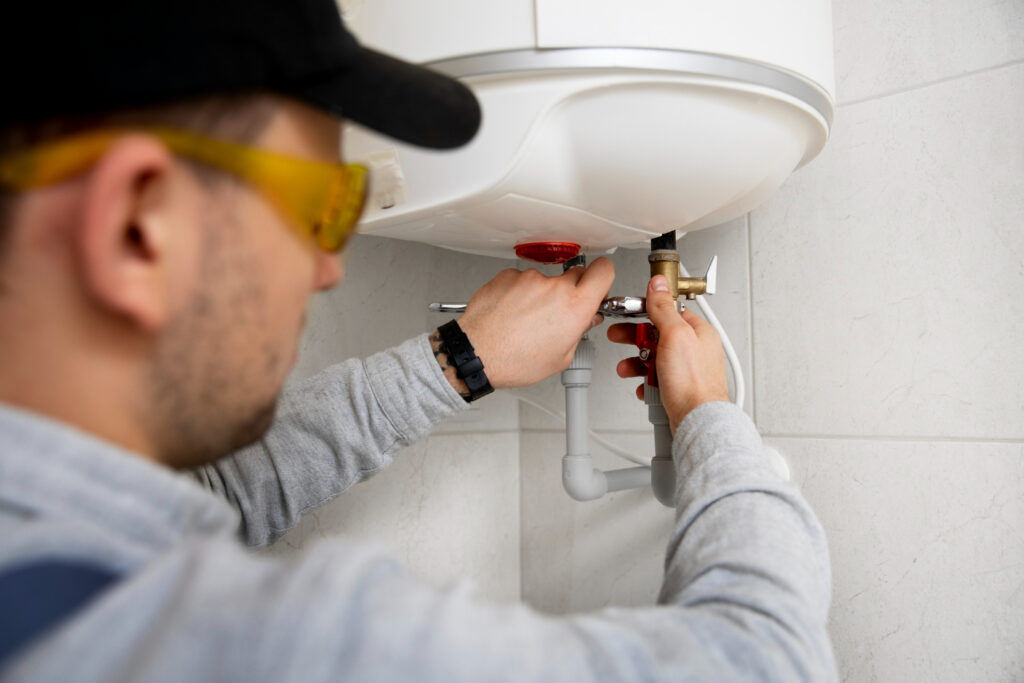Boiler leaks are one of those things that you want to happen when you need it the least, like winter when you are heavily relying on the heating system. The presence of water near your boiler can be worrying, especially since a leaking boiler can be a safety concern. If you notice a damp floor around your boiler, you must pay close attention to this problem. In this article, we will discuss what to do if your boiler is leaking under the floor, common causes for this issue, and how you can prevent this in the future.
Understanding Boiler Water Leaks: The Fundamentals
Water underneath the boiler is usually caused by a fault in one of the internal components of the boiler or its connections. While it may seem like boiler leaks are only external, it is the internal pipe leak which usually results in puddles of water under your boiler. A small leak can sometimes just be a drip of water but be sure to pay attention to this as it can quickly develop into a larger leak, resulting in larger pools of water from your boiler.
Boiler systems are complex and water can potentially leak out of many weak points. Each part has an important function in the home’s heating and hot water systems and when it malfunctions, the water can leak out, and typically, this means on the floor where you have placed the boiler.
Primary Causes of Boiler Water Leaks
Pressure Relief Valve Discharge
A pressure relief valve is a safety feature designed to release water if pressure inside the boiler becomes too high. When it is working properly, it prevents dangerous pressure build-up that could damage your boiler or cause safety hazards. If the pressure relief valve is discharging frequently, there may be an issue with your boiler that requires repair.
The cause of the high pressure can be due to a number of factors, such as a faulty expansion vessel, a blocked condensate pipe, or a problem with the filling loop. The water coming from this leak will usually look like a drip or dribble of water coming out from beneath your boiler. You may also notice a hissing sound when the pressure relief valve is releasing water.
Heat Exchanger Deterioration
The heat exchanger is the part of your boiler that is responsible for transferring the heat from the burner to the water that flows through your heating system. With time, this can develop hairline cracks, especially if it is old or if your water quality is poor.
Heat exchanger leaks will often start out as a small seepage that slowly gets worse over time. The water that is leaking from the heat exchanger will often be rusty or discoloured, which is a sign that there is corrosion inside the boiler. If your boiler has been neglected for a long period or has undergone numerous expansion and contraction cycles, the chances of a heat exchanger leak increase.
Internal Pipe and Joint Failures
The network of pipes and joints that are inside your boiler create several potential weak points where leaks can develop. Pipes and joints can loosen over time because of expansion and contraction, vibration, or general wear and tear. Copper pipes can develop pinhole leaks from erosion or corrosion, and plastic components can become brittle and crack over time.
Failures at joints can often occur at compression fittings, soldered connections, or threaded joints. These leaks may be intermittent at first, only becoming evident when the system is pressurized or when the boiler is running at a high temperature.
Pump Seal Degradation
The pump is responsible for circulating water throughout your heating system and its seals can become damaged or worn out over time. If the pump seal fails, it will often leak water from the pump casing, which then drips down and accumulates beneath the boiler.
Pump seal failures are often accompanied by unusual noises coming from the pump, such as grinding or squealing sounds. A pump seal problem can also develop over time, beginning as a small weep and slowly worsening. The water that is leaking from the pump seal is often clear, and there may also be air entering the system which can lead to cold spots in your radiators or reduced heating efficiency.
Identifying the Source of Your Boiler Leak
Visual Inspection Techniques
Before attempting any inspection, ensure your boiler is switched off and has cooled down completely. Begin by examining the area directly beneath the boiler, looking for water stains, mineral deposits, or active dripping. Use a torch to illuminate hard-to-see areas and trace any water trails back to their source.
Check the boiler casing for obvious signs of water escape, including rust stains, white mineral deposits, or wet areas around joints and connections. Pay particular attention to the base of the boiler where components meet the casing, as this is where internal leaks often become visible.
Distinguishing Between Internal and External Leaks
External leaks typically originate from visible pipes, radiator connections, or valves outside the boiler casing. These are often easier to identify and may be less serious than internal leaks. Internal leaks, however, originate from components within the boiler itself and usually indicate more significant problems.
Internal leaks may not be immediately apparent, as water can travel along internal components before dripping from the boiler’s lowest point. This can make diagnosis challenging, as the visible leak may be some distance from the actual failure point.
Water Quality Analysis
The appearance and characteristics of leaked water can provide valuable clues about its source. Clear water typically indicates fresh system water, possibly from a pressure relief valve or external pipe. Rusty or discoloured water suggests internal corrosion, particularly within the heat exchanger or primary pipework.
Black or very dirty water may indicate sludge build-up within the system, whilst oily or greasy water could suggest contamination from system additives or maintenance products.
Step-by-Step Diagnostic Process
Initial Safety Assessment
Your safety is paramount when dealing with boiler leaks. Before beginning any investigation, switch off the boiler and allow it to cool completely. If you notice gas smells, electrical issues, or large volumes of water, evacuate the area and contact emergency services immediately.
Check that the leak hasn’t affected any electrical components or created slip hazards. Place towels or containers to catch dripping water and prevent damage to flooring or furnishings.
Systematic Component Examination
Begin your inspection at the highest point of the boiler and work downward, as water always flows due to gravity. Examine each visible component for signs of moisture, corrosion, or damage. Use a dry cloth to wipe away any existing moisture, then monitor for new water appearance to identify active leaks.
Pay particular attention to joints, connections, and seals. Look for white residue or mineral deposits that indicate historical leaking, even if no active leak is currently visible.
Pressure System Analysis
If your boiler has a pressure gauge, note the current reading and compare it to the manufacturer’s recommended operating pressure (typically between 1.0 and 2.0 bar for most domestic systems). Low pressure may indicate a significant leak, whilst high pressure could cause pressure relief valve discharge.
Monitor pressure changes over time, as fluctuating pressure can indicate intermittent leaks or system problems that require professional attention.
Also Read: Can Your Combi Boiler Handle Two Showers Simultaneously?
Professional Repair Approaches
When to Contact a Gas Safe Engineer
Boiler repairs require specialised knowledge and certification. Any work involving gas appliances must be carried out by Gas Safe registered engineers to ensure safety and compliance with regulations. Contact a professional immediately if you suspect heat exchanger problems, gas leaks, or significant water leaks.
Professional diagnosis can identify problems that aren’t immediately apparent and ensure that repairs are carried out safely and effectively. Attempting DIY repairs on gas appliances is dangerous and illegal.
Repair vs. Replacement Considerations
The decision between repairing and replacing a leaking boiler depends on several factors, including the age of the unit, the extent of damage, and the cost of repairs relative to replacement. Generally, boilers over 10-15 years old with significant leaks may be more economical to replace.
Modern boilers offer improved efficiency and reliability compared to older models, potentially offsetting replacement costs through reduced energy bills and maintenance requirements.
Expected Repair Costs
Repair costs vary significantly depending on the problem’s nature and severity. Minor seal replacements might cost £100-200, whilst heat exchanger repairs or replacements can cost £500-1500. Complete boiler replacement typically ranges from £2000-5000, depending on the system type and installation complexity.
Preventative Maintenance Strategies
Annual Service Requirements
Regular boiler servicing is essential for preventing leaks and ensuring safe operation. Annual services should include comprehensive inspections of all internal components, pressure testing, and replacement of worn seals or gaskets before they fail.
Professional servicing can identify potential problems before they cause leaks, saving money on emergency repairs and preventing water damage to your property.
System Water Quality Management
Poor water quality accelerates boiler component deterioration and increases leak risk. Installing magnetic filters and using appropriate system additives can protect against corrosion and sludge build-up. Regular water testing and treatment ensure optimal system performance and longevity.
Consider power-flushing your system every 5-10 years to remove accumulated debris and corrosion products that can cause component failures.
Early Warning Sign Recognition
Learning to recognise early warning signs can prevent minor issues from becoming major leaks. Key indicators to monitor include:
• Unusual noises such as banging, gurgling, or whistling sounds during operation
• Pressure fluctuations shown on the boiler gauge, particularly frequent pressure drops
• Reduced heating efficiency with radiators taking longer to warm up or cold spots developing
• Visible corrosion around joints, pipes, or the boiler casing
• Water stains or mineral deposits beneath or around the boiler
• Increased energy bills without corresponding increases in usage
• Error codes appearing frequently on the boiler display
• Strange smells such as metallic odours or unusual dampness around the boiler area
Monitor your boiler’s performance regularly and address issues promptly to prevent costly failures and water damage.
Emergency Response Procedures
- Immediate Actions for Active Leaks
If you discover an active boiler leak, your immediate priority is damage limitation and safety. Switch off the boiler immediately and turn off the water supply if the leak is significant. Place containers to catch dripping water and use towels to prevent spread.
Contact a Gas Safe registered engineer for emergency repairs, particularly if the leak is substantial or you suspect gas involvement. Don’t attempt temporary fixes with tape or sealants, as these can mask serious problems and create safety hazards.
- Water Damage Prevention
Act quickly to prevent water damage to flooring, walls, and furnishings. Remove any items from the affected area and use fans or dehumidifiers to accelerate drying. Document the damage with photographs for insurance purposes.
Consider contacting your insurance company to report the leak and understand your coverage options. Many policies cover sudden and unexpected water damage from boiler failures.
- Temporary Heating Solutions
While waiting for repairs, consider temporary heating alternatives such as electric heaters for essential rooms. Ensure adequate ventilation if using portable gas heaters and never use camping stoves or barbecues indoors.
If hot water is affected, electric immersion heaters or electric shower units can provide temporary solutions.
How Local Boiler Can Guide You Through Boiler Emergencies
When facing a boiler leak, having access to expert guidance can make the difference between a minor inconvenience and a major emergency. Local Boiler understands the urgency of boiler problems and provides comprehensive support to help homeowners navigate these challenging situations effectively.
The experienced team at Local Boiler recognises that boiler leaks rarely occur at convenient times. Their expertise extends beyond simple repairs to include emergency response guidance, helping you take appropriate immediate action while professional help is arranged. This comprehensive approach ensures that you can minimise damage and maintain safety whilst awaiting professional intervention.
Our commitment to customer education means they provide detailed explanations of problems and solutions, empowering homeowners to make informed decisions about repairs or replacements. Their transparent approach to diagnostics and pricing ensures that you understand exactly what needs to be done and why, without unnecessary jargon or hidden costs.
Understanding Boiler Warranties and Insurance
Manufacturer Warranty Coverage
Most new boilers come with comprehensive warranties covering parts and labour for several years. Understanding your warranty terms is crucial when dealing with leaks, as covered repairs can save significant costs. Keep warranty documentation safe and ensure annual services are carried out by approved engineers to maintain coverage.
Warranty claims typically require proof of proper maintenance and may exclude damage caused by poor water quality or neglected servicing. Review your warranty terms carefully to understand what’s covered and any conditions that must be met.
Home Insurance Considerations
Many home insurance policies cover sudden and unexpected water damage from boiler failures, including damage to flooring, walls, and contents. However, coverage varies significantly between insurers and policies.
Review your policy terms to understand what’s covered and any excess payments required. Some insurers offer additional boiler cover that includes annual services and emergency repairs.
Modern Boiler Technology and Leak Prevention
Advanced Diagnostic Systems
Modern boilers incorporate sophisticated diagnostic systems that can detect problems before they cause leaks. These systems monitor pressure, temperature, and component performance, alerting users to potential issues through error codes or warning lights.
Understanding your boiler’s diagnostic system can help you identify problems early and provide valuable information to engineers when seeking repairs.
Improved Component Reliability
Advances in materials and manufacturing have significantly improved boiler component reliability. Modern heat exchangers use corrosion-resistant materials and improved designs that reduce leak risk. Similarly, new pump technologies and seal materials offer extended service life.
These improvements mean that newer boilers typically require less maintenance and have lower leak risk compared to older models.
Smart Control Integration
Smart boiler controls can monitor system performance remotely and alert homeowners to problems via smartphone apps. These systems can detect pressure drops, temperature anomalies, and other indicators of potential leaks before they become serious.
Smart controls also enable remote system shutdown in emergencies and can schedule maintenance based on actual system performance rather than arbitrary time intervals.
Environmental Considerations
Water Conservation
Boiler leaks waste significant amounts of water and energy, contributing to environmental impact and increased utility bills. Prompt repair of leaks conserves resources and reduces your carbon footprint.
Consider upgrading to high-efficiency boilers when replacement is necessary, as these units use less fuel and water whilst providing improved performance.
Proper Disposal of Replaced Components
When boiler components require replacement, ensure proper disposal through licensed waste carriers. Many materials, including copper and steel, can be recycled, reducing environmental impact.
Old boilers contain materials that require specialist disposal, particularly older models that may contain asbestos or other hazardous substances.
Conclusion
Boiler water leaks from underneath require prompt attention and professional diagnosis to prevent damage and ensure safety. Understanding the common causes, recognising warning signs, and knowing when to seek professional help can save money and prevent emergencies.
Regular maintenance, quality water treatment, and prompt attention to minor issues prevent most serious leaks. When problems do occur, working with experienced professionals like Local Boiler ensures that repairs are carried out safely and effectively.
Remember that boiler safety is paramount, never attempt DIY repairs on gas appliances, and always use Gas Safe registered engineers for any work involving your heating system. With proper care and professional support, your boiler can provide reliable, safe heating for many years.
By taking a proactive approach to boiler maintenance and understanding the warning signs of potential problems, you can enjoy peace of mind knowing that your heating system will continue to keep your home warm and comfortable throughout the year.

Sunny Saini is a certified heating engineer with over 15 years of experience in maintaining and repairing boilers. He specializes in diagnosing complex boiler issues and providing reliable solutions to ensure homeowners stay warm and comfortable throughout the year.





![]=](https://localboiler.co.uk/wp-content/uploads/2024/05/Untitled-design-96-300x300.jpg)